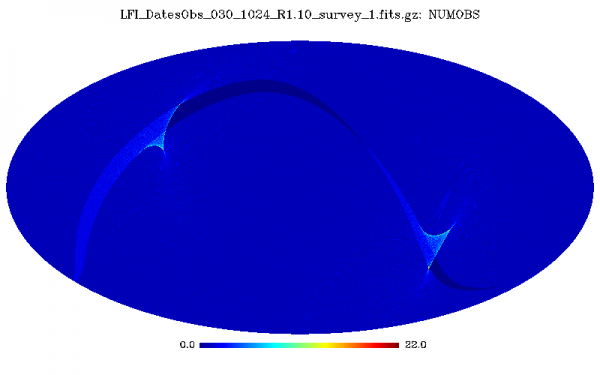Difference between revisions of "DatesObs"
| (13 intermediate revisions by 3 users not shown) | |||
| Line 1: | Line 1: | ||
| − | + | == Overview == | |
| − | |||
| − | + | The DatesObs files are not official Planck products but have been made available for the convenience of the community. They contain timing information split by survey, gridded by HEALPIX pixel, and sampled by UTC day. They are intended for investigation of inter-survey source variability, comparison with external observations, and understanding of the survey strategy. | |
| − | There are 27 files for all combinations of instrument | + | |
| + | == File Format == | ||
| + | |||
| + | There are 27 files for all combinations of the 9 instrument bands and 3 surveys. The files themselves are: | ||
* FITS format, with data in the first extension | * FITS format, with data in the first extension | ||
* RING-ordered HEALPIX | * RING-ordered HEALPIX | ||
| Line 10: | Line 12: | ||
They contain two fields: | They contain two fields: | ||
| − | * DATESOBS - list of UTC days on which the pixel was observed | + | * DATESOBS - string - comma-separated list of UTC days in YYMMDD format on which the pixel was observed |
| − | * NUMOBS - | + | * NUMOBS - integer - the number of UTC days on which the pixel was observed |
| + | |||
| + | Unobserved pixels have been left blank. | ||
| + | |||
| + | == Generation == | ||
| + | |||
| + | The DATESOBS files were generated by projecting the line-of-sight of each detector onto the sky on a ring-by-ring basis. Inputs were the satellite spin-axis and the opening angle of each detector. Position is thus accurate to nearest pixel center and timing to the start of each ring - rings over midnight are only counted for the day in which they begin. | ||
| + | |||
| + | Note no beam information was used, just closest line-of-sight. The list of dates within a beam width is thus the union of the date information for all pixels within the appropriate area. | ||
| + | |||
| + | Pixels were counted observed if hit by a single detector within each instrument band; there was no consideration of intra-band coverage. | ||
| + | |||
| + | Detectors not used in production of the frequency maps were excluded. | ||
| + | |||
| + | Finally the data have been masked by the per-survey SkyMap hit-maps in order to remove areas which were flagged during the processing (mainly planet crossings). The survey_3_partial DatesObs files are unmasked as no survey_3 maps are available. | ||
| + | |||
| + | == Healpix IDL read_fits_map == | ||
| + | |||
| + | Note the datesobs files cannot be read by Healpix's IDL read_fits_map routine as it is not expecting string content. There is no problem with the standard AstroLib mrdfits. | ||
| + | |||
| + | [[file:numobs.png|thumb|600px|center|Full-sky map of the number of observations in the first survey.]] | ||
| + | |||
| + | [[Category:Mission products|013]] | ||
Latest revision as of 17:26, 19 July 2013
Overview[edit]
The DatesObs files are not official Planck products but have been made available for the convenience of the community. They contain timing information split by survey, gridded by HEALPIX pixel, and sampled by UTC day. They are intended for investigation of inter-survey source variability, comparison with external observations, and understanding of the survey strategy.
File Format[edit]
There are 27 files for all combinations of the 9 instrument bands and 3 surveys. The files themselves are:
- FITS format, with data in the first extension
- RING-ordered HEALPIX
- NSIDE 1024 for LFI, and 2048 for HFI
They contain two fields:
- DATESOBS - string - comma-separated list of UTC days in YYMMDD format on which the pixel was observed
- NUMOBS - integer - the number of UTC days on which the pixel was observed
Unobserved pixels have been left blank.
Generation[edit]
The DATESOBS files were generated by projecting the line-of-sight of each detector onto the sky on a ring-by-ring basis. Inputs were the satellite spin-axis and the opening angle of each detector. Position is thus accurate to nearest pixel center and timing to the start of each ring - rings over midnight are only counted for the day in which they begin.
Note no beam information was used, just closest line-of-sight. The list of dates within a beam width is thus the union of the date information for all pixels within the appropriate area.
Pixels were counted observed if hit by a single detector within each instrument band; there was no consideration of intra-band coverage.
Detectors not used in production of the frequency maps were excluded.
Finally the data have been masked by the per-survey SkyMap hit-maps in order to remove areas which were flagged during the processing (mainly planet crossings). The survey_3_partial DatesObs files are unmasked as no survey_3 maps are available.
Healpix IDL read_fits_map[edit]
Note the datesobs files cannot be read by Healpix's IDL read_fits_map routine as it is not expecting string content. There is no problem with the standard AstroLib mrdfits.
Universal Time Coordinate(d)
Flexible Image Transfer Specification
(Planck) Low Frequency Instrument
(Planck) High Frequency Instrument
